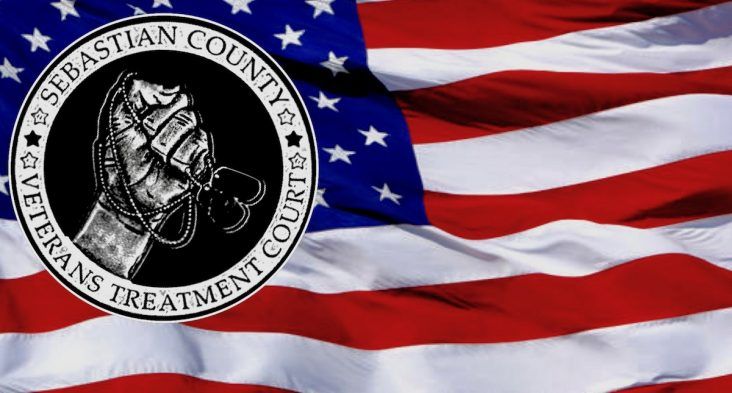Grant to expand veteran access to Sebastian County treatment court
by June 9, 2020 5:02 pm 951 views

A $1.9 million grant will allow the Sebastian County Veterans Treatment Court to double the number of veterans able to go through the court. The Veterans Treatment Court is a court-supervised, comprehensive treatment program for eligible offenders.
Since Sebastian County Circuit Court Judge Stephen Tabor began the program in July 2015, those eligible have been limited to veterans charged with a felony offense who are eligible for VA Healthcare benefits. Participants also must be approved for participation by their attorney, the prosecuting attorney and the presiding judge.
“We have learned over time there are a number of worthy veterans who would benefit from the court who were not VA eligible,” Tabor said in a released statement.
The grant from the Substance Abuse and Mental Health Services Administration will begin July 31, with the almost $2 million over five years allowing 125 non-VA eligible veterans to benefit from the program.
“Veterans who are not VA eligible are often uninsured or underinsured and don’t have the means to self-pay for services. With this grant we will be able to ensure that Veterans who would otherwise be eligible for this court diversion program may participate because we are now able to receive the required services at no charge to them,” said Johanna Thomas, associate professor in the School of Social Work at the University of Arkansas and a licensed social worker in the state of Arkansas.
Thomas and John Gallagher, also an assistant professor of social work and licensed social worker in Arkansas, worked with Tabor and his staff on the initiative.
Reasons for a veteran to not be VA eligible service in the National Guard or Reservist status, exceeding income requirements or having an other-than-honorable discharge status. It is estimated that about half of all justice-involved veterans are non-eligible for VA benefits.
“Since the VA provided all of the treatment for participants, this was a significant obstacle to expansion. I began to explore different avenues for providing treatment to these candidates and through our Mentor Coordinator Aaron Decelle was introduced to three college professors, two from UA-Fayetteville and one from American University in Washington, D.C., who were instrumental in preparing our successful grant application for this purpose,” Tabor said.
The practical impact is that those otherwise eligible for the program will not be shut out from the court due to their lack of VA eligibility. The court accepts Sebastian County defendants who plead directly into the court as well as qualifying Crawford County defendants. The voluntary program includes regular court appearances before the presiding judge; supervision by a probation officer; treatment tailored to address the individual’s needs; and drug testing.
Tabor modeled veterans’ court after drug court, with four phases. Though the program length is determined by the participant’s progress, it is never less than 20 months, the program’s handbook states. Participants are required to appear in court weekly while in phase one, every other week while in phases two and three, and monthly once they reach phase four.
Though violent offenders are not eligible for drug court, violent offenders are evaluated on a case-by-case basis for veterans’ court because of conditions like post-traumatic stress disorder and other conditions suffered by veterans. A history of sexual offenses is an excluding factor, the county’s website states. Participants have to plead guilty to their offense, but successful completion of the program results in dismissal of charges.
“The recidivism rate for Specialty Graduates is substantially lower than other offenders. Some have gone on to owning businesses, graduating college, and almost all have dramatically improved their work opportunities and personal relationships,” the county’s website states.
The operation of Veterans’ Court is based on a team concept that involves attorneys and staff from both the prosecutor’s office and the public defender’s office, counselors, supervising officers, VA, and administrative staff. The program also uses mentors, a fellow veteran who stands along beside the participant to help and add accountability, Tabor said.
Over the last three years, 58 participants have gone through the court. Only one has had a new arrest or conviction, said Janet Hawley, the state’s specialty court coordinator.
“That is really outstanding. That’s a 98% success rate,” Hawley said. “I really credit Judge Tabor with that success. He makes certain to keep up with and implement the best practice standards.”
There are 26 participants in the program, a number Hawley said would be higher had the COVID-19 pandemic not affected court programs throughout the state. While the pandemic might have made it so participants had to wait to enter the program and required those in the program to meet virtually for court, Tabor said participants have continued on their roads to success.
“Zoom court severely limited things, but their bond as former military has meant that they have held each other accountable during this time,” Tabor said.
Part of that accountability has come because of the mentors, which Tabor said are a key part of the success of the program. With the increase in the number of participants that will be eligible for the program, there is a great need for more mentors, he said.
Veteran mentors engage the participant, provide encouragement and empowerment and help the participant successfully achieve life goals and graduate from the program. Veterans in the community who can give a few hours a month to the program can contact Aaron DeCelle at (479) 799-3338 or email [email protected].
